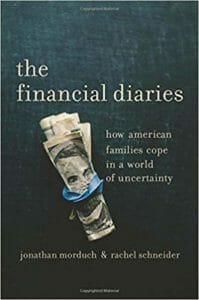Written By: Shawn L. Carlson, Ph.D. Student, Developmental Science Department of Human Development and Family Science, North Dakota State University
 |
The U.S. is a country filled with many opportunities to fulfill one’s dreams. From pursuing a college degree, home ownership, and a happy retirement, these aspirations that many Americans hold can be far from reality. The Financial Diaries: How American Families Cope in a World of Uncertainty, a book by Jonathan Morduch and Rachel Schneider, highlights that Americans can be doing everything right financially, but still face economic disparity and uncertainty. The financial stress that families bear to make ends meet is the true reality for many in this country.
Morduch and Schneider’s book stems from never done before research that utilizes financial diaries. The study examines the financial lives of over 200 families across the country that were middle to low-income earners over a period of a year. The book unfolds some of their lives and the difficult financial decisions they had to make to provide for their families.
In one instance, you will meet Becky and Jeremy, a family with four children who live in Ohio. Becky does not have a full-time job, but volunteers her time at an animal shelter and occasionally cleans her neighbors’ homes for pay. Jeremy is a truck mechanic who works overnights on commission. In order to create some stability in their income, Jeremy finds a similar position as a mechanic with guaranteed 40 hours a week, with working hours during the day. However, his annual income is lower than that of his previous job and he has a much longer commute. Jeremy’s new job seems like a blessing to this family, although their already fragile income is decreasing. A sense of steady income and control over their daily finances is a big win for this family.
The snapshot into Becky and Jeremy’s financial life is only one of many stories that are chronicled in this book. Morduch and Schneider provide detailed accounts in how these families earn, spend, save, borrow, and share money, which are titles to some of the chapters in this book. As each family’s financial situation is shared, it becomes apparent that they are at an intersection in American society that hinders their health and financial well-being. They are families that make too much over the poverty line to receive much needed financial benefits from the government, but earn too little to live comfortably and not have to constantly think about their every financial decision, even when buying a pack of gum. Their financial goals are short-term instead of long-term in order to survive the ups and downs of everyday life.
This book not only provides insight into the day-to-day financial life of struggling Americans, but it is a reference of how negative financial situations can be turned into positive ones. It will energize financial counselors in their work with individuals and families, and set a precedent of helping them thrive and reach their financial goals and dreams. It shows that there is no equation for financial stability that can be prescribed. Each client’s situation needs to be evaluated and heard before we can fully help them achieve their financial goals.